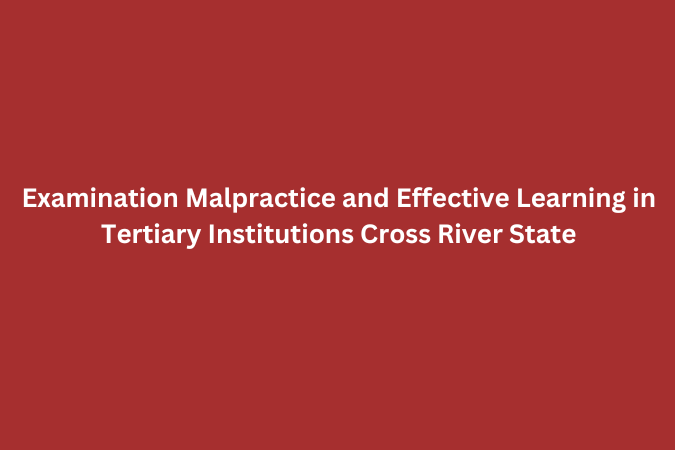Advertisements
Abstract
The major aim of this project was to carry out an investigation into the examination malpractice on effective learning, in Tertiary institutions in Cross River state.
In the study. The survey design was adopted in this research work in order to carry out an assessment of public opinion of the respondents on the attitudinal behaviour of students towards examination malpractice. The questionnaire technique was used to collect necessary data. The stratified sampling technique was used to collect necessary data. The stratified sampling technique was adopted to select the respondents (male/female) students which represented the entire population of the students in the selected tertiary institutions.
The t-test statistical tool was used to determine whether there was significant difference between the students who involve themselves in examination malpractice especially in Mathematics and English Language subjects and those who do not.
Chapters 1 – Background of Study
Education is an important instrument that can be used to objectively evaluate and assess students’ learning outcomes and ability to demonstrate knowledge and understanding of different concepts or ideas. Actions and practices that undermine the integrity of the examination process, therefore, pose a serious threat to the quality and credibility of the students’ learning outcomes. Examination malpractices are an example of such actions that threaten the integrity of examinations, and/or damage the authority of those responsible for conducting them. Examination malpractices are also a threat to the validity and reliability of the educational system
Advertisements
Chapter 2 – Conceptual Frame Work
Examination malpractice has been given different meanings by different scholars with the meanings pointing at one thing. Akpama, Bassey, Idaka and Bassey (2009) viewed examination malpractice as an unlawful behaviour or activity engaged by school children at whatever level of education, to have personal advantage in examination over their mates who are completing in the same examination. Joshua (2008) opined that examination malpractice is any unauthorized or unapproved action, inaction, activity, behaviour or practice that is associated with the preparation, conduct and processing of examination and other forms of assessment and carried out by any person involved in preparing for, giving, taking and processing that examination at any level. In the view of the University of Cross River Academic Policies (2009), examination malpractice refers to all forms of cheating which directly or indirectly falsify the ability of the students. The definition above is an “unwholesome behaviour which help the doer to perform better than he / she would ordinary done if not for the act”.
Chapter 3 – Design of the Study
The researcher adopted a descriptive survey research method in ascertaining. The influence of students attitudinal behaviour towards examination malpractice on effective learning among university students, using selected schools in Cross River Local Government Area. A descriptive survey research method according to Iwuji (2000) „is primarily intended to describe the nature and degree of conditions which exist‟. Osegbo and Enemou (2009) posited: „descriptive survey are concerned with the description of events as they are‟.
References
Abdullahi, F. (2010). A Study of Self Concept and Academic Achievement of University Students. Unpublished Masters Theses Submitted to Department of Educational Psychology and Counseling. Ahmadu Bello University Zaria, Nigeria
Ahmed, M. J. (2010). An Evaluation of Attitude of Pastoral Nomads Towards Basic Education Programme in Nasarawa State. Unpublished Masters Theses Submitted to Department of Educational Psychology and Counseling. Ahmadu Bello University Zaria, Nigeria
Aronson, A. E.,Timothy, D., Robin, W.,& Akert, A. (2008). Social Psychology. United State of America: Upper Saddle River.
Advertisements


